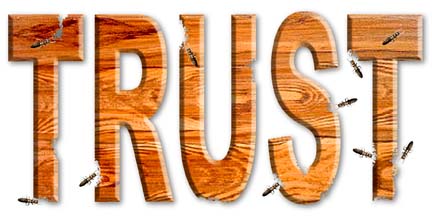

A forum for Hawaii's
business community to discuss
current events and issues

|
Once you lose it,
it's hard to regain
Customers or workers treated
unfairly by your company rarely
forgive and they never forget
When my wife and I bought our home, the bank required a full termite inspection before a mortgage would be granted. When the report came back: "No active termites," the bank issued us the loan we need to complete the purchase. It wasn't until we moved into our home and began some renovations that we realized that the operative word in the bank's abstract report was active.
The reason why there were "No active termites," was because virtually all the internal studs that were hidden from easy visual observation had already been eaten away. The termites had left for greener pastures.
In retrospect, I should have been a bit wary, as the mortgage was given on the value of our land, and the house was noted to be of virtually no value! But the bank was totally within their rights. They were under no legal obligation to tell me any more than they did.
As I have listened to executive after executive talk about how important trust among and between all staff is to their own organization's ability to achieve excellence, I often found myself reflecting on my house experience. So in the next series of articles, we will address the issue of trust, its easily visible -- and not-so-easily visible -- impact on the all important quality of the relationships that determine any organization's ability to achieve excellence.
THE FIRST THING we must acknowledge is that trust, without clear behavioral specification, is one of those abstract ideals that can be debated, ad infinitum, to little avail.
My bank did nothing 'untrustworthy,' in the legal sense of the term. So why did I mistrust them immediately after gaining full knowledge of the truth? Because I felt they 'knowingly' withheld information from me for self-serving reasons. I felt they violated a moral trust, a fiduciary trust. In other words, they assumed -- I assumed -- that I might not purchase the house and, therefore, not borrow their money -- money, which, at the time of purchase in 1981 carried an 18-plus percent interest rate!
Several things of importance about this complicated multifaceted concept of trust are reflected in this last paragraph. While trust and honesty are bedmates, I cannot accuse my loan officer of being dishonest, untrustworthy. She did not lie to me. She merely was implementing organizational policy.
To be sure, I could have asked. But when you are unknowing, when you don't even know enough to know what to ask, it is a time of increased need to trust in the first place.
So point number one about trust is that what we call interpersonal trust, albeit it related to, is separate and distinct from organizational trust.
As an employee, you may feel your own supervisor is perfectly trustworthy, however you define that in specific behavioral terms, and still feel that your "organization" is not.
Policies and procedures that facilitate unfair unequal treatment of employees (hiring, performance appraisal, promotion, etc.) will, like termites, erode a sense of organizational trust. And, as Robert Galford and Anne Drapeau ("Enemies of Trust," Harvard Business Review, February 2003) note: "If people think an organization acted in bad faith, they'll rarely forgive, and they never forget."
However, while this distinction between system levels and interpersonal levels of trust is useful, it begs an essential point. There is no such thing as an "organizational policy or procedure" separate from the individuals who created them in the first place and decided to maintain them thereafter.
When certain individuals -- those in positions of higher power -- allow themselves to create policies and procedures that erode an employee's sense of organizational trust, they are contributing to what we all recognize as familiar "we-they" dynamics.
Those who feel "violated," "threatened" and "mistrustful" in some way by what "they" have done to "us" bond together.
All of "us" and all of "them" trust one of our own more than we trust one of them, sometimes blindly.
We need only recall any recent labor strike we've endured to be reminded that the result of these ever-widening trust gaps are a lose-lose.
temenos@lava.net or visit temenosinc.com.
To participate in the Think Inc. discussion, e-mail your comments to business@starbulletin.com; fax them to 529-4750; or mail them to Think Inc., Honolulu Star-Bulletin, 7 Waterfront Plaza, Suite 210, 500 Ala Moana, Honolulu, Hawaii 96813. Anonymous submissions will be discarded.